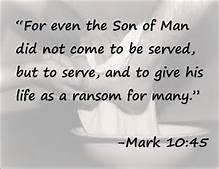“Saved by Grace through Faith”

Romans 3:23-24 – October 28, 2018
I have been called for jury duty four times. Yes, one of those times I did serve on a jury, and I was one of that jury in a murder trial. I vividly remember the judge and his instructions to us as the jury. This particular judge had quite a presence. I could see everyone in that courtroom sitting up a little straighter, or paying more close attention when he spoke.
Is that your idea of a judge? Someone in black robes, sitting in judgment on a case with fairness and equity? A judge, someone evenhanded, listening to both sides of the legal question at hand before making a final decision on the case?
I am afraid that not all people think of judges in this way. In some parts of the world, judges can be less than fair, not exactly honest, and even mean or hurtful. I wanted to point out that this kind of flawed judge was certainly not what the Apostle Paul was thinking about here. Not here in Romans chapter 3.
We need to consider some background, if we are going to look at the book of Romans. This letter was written by Paul at a time when he was in prison. Paul had never been to Rome, even though he was born a Roman citizen. He knew a number of people who had over the years relocated to Rome. In fact, the small group of believers in Rome had probably written to Paul first, and they asked Paul to answer some theological and religious questions, and give them some of the Godly wisdom that comes from above.
The majority of Christ-followers at this time were Jewish, but not all of them. Paul started this section of the letter with a discussion of the Mosaic Law. I can just hear the responding comments by the Roman Christians who are also Gentiles: “Why are you talking about the Jewish Law Code?” In these beginning chapters of Romans, Paul is setting up an argument. He tells the Roman believers that ALL have sinned. Not just the Jews, under the Jewish or Mosaic Law Code. ALL have fallen short of God’s expectations.
Here in Romans 3 Paul highlighted the Law of Moses, and how difficult it is that anyone could be considered righteous. Another way of saying this is: The Law, in which the Jew boasted and the possession of which the Jew took for righteousness, is not able to make any one righteous but only to show them to be unrighteous. [1]
Sure, there is a whole lot of talk about unrighteousness in Romans. Paul comes right out and says, “For all have sinned and fall short of the glory of God.” Romans 3:23 is a verse countless Christians have used over the centuries to let people know what a rotten state we are all in. Notice that this verse does not say “For some have sinned,” or even “For most have sinned.” No. we ALL have sinned. We ALL have shown how unrighteous we are. We ALL fall short of the glory of God, that glory that goes so far beyond words.
Just between you and me, I am very glad we do not use the Mosaic Law to be our rulebook now for the believers’ faith. Paul even says so a couple of verses before, “Therefore no one will be declared righteous in God’s sight by the works of the law; rather, through the law we become conscious of our sin.” In other words, ALL have fallen short of God’s expectations.
If that were the case, I do not know how anyone could pass through such strong judgment and find reconciliation with God. That is, without Jesus. He is the whole point of Romans, and Paul returns to Him again and again. Thank God we do not need to stop at Romans 3:23! Paul does not stop there, either, but instead goes on: “ 24 and all are justified freely by his grace through the redemption that came by Christ Jesus.”
That is good news! I don’t know whether we fully understand it, but that’s good news!
Grace. That word is a simple enough word. However, I don’t want to put anyone on the spot and ask them what exactly “grace” means. I do remember an acrostic definition, from years ago. Grace is God’s Riches At Christ’s Expense.
Notice, please, that these two verses of Romans 3 tell us the whole Gospel. The whole Good News. The first, Romans 3:23, tells us why we are sunk, separated from God for eternity. The second, Romans 3:24, tells us we are justified by grace. We are drawn back into God’s presence, and are redeemed by Christ Jesus our Lord.
I’ve related this before, I am proud to say that I was raised as a Lutheran on the northwest side of Chicago. I was baptized and confirmed at that Lutheran church. I was fascinated by Martin Luther, the founder of the Lutheran denomination. When I was in high school, I learned as much as I could about Martin and his soul-wrenching journey to better understand this blessed fact—that he was saved by grace through faith.
Martin was a learned theologian, yes. But Martin felt sinful and unlovable, too. What’s more, even after lots and lots of good works and all these years of reading and study, he still felt so inadequate. Martin felt God could not possibly love or forgive him. He knew lots of things about Jesus intellectually, but he still did not grasp this central understanding.
Remember Romans 3:23? “For all have sinned and fall short of the glory of God.” Yes. Yes! That is true. But—that isn’t the whole story! Reading, starting from 3:21: “21 But now apart from the law the righteousness of God has been made known, to which the Law and the Prophets testify. 22 This righteousness is given through faith in Jesus Christ to all who believe. There is no difference between Jew and Gentile, 23 for all have sinned and fall short of the glory of God, 24 and all are justified freely by His grace through the redemption that came by Christ Jesus.”
I can almost see Martin falling off his chair, once he realizes how huge this is. Our sin is taken away through the redeeming that came through Jesus. We are made lovable through God’s grace. Our low self-worth and low self-esteem is now viewed by God through Jesus. God looks at all of us, each one of us, through Jesus-tinted lenses.
We are all saved by grace, through faith. What tremendous Good News. No, it’s Great News! It’s the most marvelous News of all time!
We will not be tried in a court of law, with all of our sins playing out on a huge screen behind us as God the Judge bangs the gavel in some heavenly courtroom. Jesus took our sins upon Himself, so we do not have to carry them any longer.
That is the best of all possible Good News! Jesus died for our sins. Jesus showed us radical, God-sized grace, and radical, God-sized love.
As I proclaim each week after the Confession of Sin during the Assurance of Pardon, “Believe the Good News of the Gospel: in Jesus Christ, we are forgiven!”
Alleluia, amen!
[1] https://bible.org/seriespage/b-righteousness-it%E2%80%99s-not-what-you-know-or-who-you-are-romans-11-326
(Suggestion: visit me at my regular blog for 2018: matterofprayer: A Year of Everyday Prayers. #PursuePEACE – and my other blog, A Year of Being Kind . Thanks!



